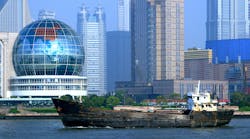The Chinese government’s zero-COVID policy continues to wreak havoc on its citizens and on the global supply chain. The largest impacts today are in Shanghai and Beijing.
Shanghai, a city of 25 million, has been in lockdown since early April. Some companies have been able to operate in the area by using a “closed-loop system,” where staff are required to live on-site.
Two weeks ago, a small group of automotive industry manufacturers were allowed to reopen their plants. A second tranche of companies has just been authorized to re-open. Dezan Shira & Associates report that the second list includes some semiconductor, pharmaceutical and logistics providers.
In the suburbs surrounding Beijing, the government recently issued a work-from-home order and closed the school system.
For companies selling in the Chinese market, these restrictions mean lost sales because Chinese consumers can’t shop. For importers of items produced in the Shanghai or Beijing areas, the quarantine restrictions severely impact product availability. Even if a supplier’s plant is open and operating, trucking restrictions are in effect. Driver restrictions impact cross-border deliveries of components. According to Maersk Lines, there has been a “significant reduction of cross-province trucks.”
Less cargo arriving at the port means less cargo is available to be shipped. The ocean carriers have responded to the drop-off in volume by cancelling upcoming vessel sailings. Over the next four weeks, 6% of transpacific sailings to Los Angeles/Long Beach are cancelled. This will keep ocean freight rates high, while giving the ocean carriers time to get their fleets back on schedule.
There is one silver lining to this drop in shipping volume: U.S. port and inland freight delays have eased. Vessel delays into L.A./Long Beach, while still high, are half of what they were late last year. The chassis shortage is easing, and rail moves are fluid again.
Unfortunately, this is likely to be a short-lived improvement. There is a large volume of backlogged cargo. Once restrictions in China are lifted, importers should anticipate a return to port congestion and delivery delays on all imported merchandise.
To combat these disruptions, companies importing from Asia should prioritize their critical shipments and customers, use alternate ports and routes whenever possible, and work closely with supply-chain partners to collaborate and reset expectations.
Lauren Pittelli is the founder and Principal of Baker Logistics Consulting Services, a consulting firm focused on addressing the international trade and transportation needs of industry. Her consulting services focus on 3PL selection and management, international air and sea transportation and customs and trade compliance. Prior to starting Baker, Lauren spent 30 years at leading international freight-forwarding companies managing their transportation, customs and contract logistics business in the Midwest. She is a graduate of Harvard College and a licensed U.S. Customs House broker.





